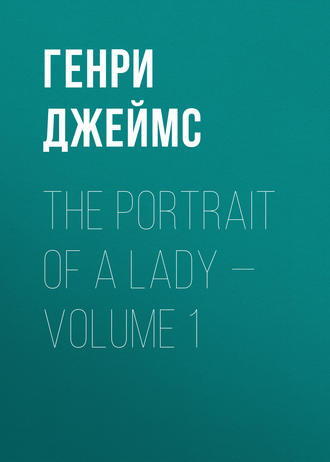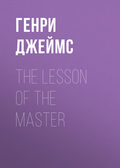
Генри Джеймс
The Portrait of a Lady — Volume 1
CHAPTER XVII
She was not praying; she was trembling—trembling all over. Vibration was easy to her, was in fact too constant with her, and she found herself now humming like a smitten harp. She only asked, however, to put on the cover, to case herself again in brown holland, but she wished to resist her excitement, and the attitude of devotion, which she kept for some time, seemed to help her to be still. She intensely rejoiced that Caspar Goodwood was gone; there was something in having thus got rid of him that was like the payment, for a stamped receipt, of some debt too long on her mind. As she felt the glad relief she bowed her head a little lower; the sense was there, throbbing in her heart; it was part of her emotion, but it was a thing to be ashamed of—it was profane and out of place. It was not for some ten minutes that she rose from her knees, and even when she came back to the sitting-room her tremor had not quite subsided. It had had, verily, two causes: part of it was to be accounted for by her long discussion with Mr. Goodwood, but it might be feared that the rest was simply the enjoyment she found in the exercise of her power. She sat down in the same chair again and took up her book, but without going through the form of opening the volume. She leaned back, with that low, soft, aspiring murmur with which she often uttered her response to accidents of which the brighter side was not superficially obvious, and yielded to the satisfaction of having refused two ardent suitors in a fortnight. That love of liberty of which she had given Caspar Goodwood so bold a sketch was as yet almost exclusively theoretic; she had not been able to indulge it on a large scale. But it appeared to her she had done something; she had tasted of the delight, if not of battle, at least of victory; she had done what was truest to her plan. In the glow of this consciousness the image of Mr. Goodwood taking his sad walk homeward through the dingy town presented itself with a certain reproachful force; so that, as at the same moment the door of the room was opened, she rose with an apprehension that he had come back. But it was only Henrietta Stackpole returning from her dinner.
Miss Stackpole immediately saw that our young lady had been “through” something, and indeed the discovery demanded no great penetration. She went straight up to her friend, who received her without a greeting. Isabel’s elation in having sent Caspar Goodwood back to America presupposed her being in a manner glad he had come to see her; but at the same time she perfectly remembered Henrietta had had no right to set a trap for her. “Has he been here, dear?” the latter yearningly asked.
Isabel turned away and for some moments answered nothing. “You acted very wrongly,” she declared at last.
“I acted for the best. I only hope you acted as well.”
“You’re not the judge. I can’t trust you,” said Isabel.
This declaration was unflattering, but Henrietta was much too unselfish to heed the charge it conveyed; she cared only for what it intimated with regard to her friend. “Isabel Archer,” she observed with equal abruptness and solemnity, “if you marry one of these people I’ll never speak to you again!”
“Before making so terrible a threat you had better wait till I’m asked,” Isabel replied. Never having said a word to Miss Stackpole about Lord Warburton’s overtures, she had now no impulse whatever to justify herself to Henrietta by telling her that she had refused that nobleman.
“Oh, you’ll be asked quick enough, once you get off on the Continent. Annie Climber was asked three times in Italy—poor plain little Annie.”
“Well, if Annie Climber wasn’t captured why should I be?”
“I don’t believe Annie was pressed; but you’ll be.”
“That’s a flattering conviction,” said Isabel without alarm.
“I don’t flatter you, Isabel, I tell you the truth!” cried her friend. “I hope you don’t mean to tell me that you didn’t give Mr. Goodwood some hope.”
“I don’t see why I should tell you anything; as I said to you just now, I can’t trust you. But since you’re so much interested in Mr. Goodwood I won’t conceal from you that he returns immediately to America.”
“You don’t mean to say you’ve sent him off?” Henrietta almost shrieked.
“I asked him to leave me alone; and I ask you the same, Henrietta.” Miss Stackpole glittered for an instant with dismay, and then passed to the mirror over the chimney-piece and took off her bonnet. “I hope you’ve enjoyed your dinner,” Isabel went on.
But her companion was not to be diverted by frivolous propositions. “Do you know where you’re going, Isabel Archer?”
“Just now I’m going to bed,” said Isabel with persistent frivolity.
“Do you know where you’re drifting?” Henrietta pursued, holding out her bonnet delicately.
“No, I haven’t the least idea, and I find it very pleasant not to know. A swift carriage, of a dark night, rattling with four horses over roads that one can’t see—that’s my idea of happiness.”
“Mr. Goodwood certainly didn’t teach you to say such things as that—like the heroine of an immoral novel,” said Miss Stackpole. “You’re drifting to some great mistake.”
Isabel was irritated by her friend’s interference, yet she still tried to think what truth this declaration could represent. She could think of nothing that diverted her from saying: “You must be very fond of me, Henrietta, to be willing to be so aggressive.”
“I love you intensely, Isabel,” said Miss Stackpole with feeling.
“Well, if you love me intensely let me as intensely alone. I asked that of Mr. Goodwood, and I must also ask it of you.”
“Take care you’re not let alone too much.”
“That’s what Mr. Goodwood said to me. I told him I must take the risks.”
“You’re a creature of risks—you make me shudder!” cried Henrietta. “When does Mr. Goodwood return to America?”
“I don’t know—he didn’t tell me.”
“Perhaps you didn’t enquire,” said Henrietta with the note of righteous irony.
“I gave him too little satisfaction to have the right to ask questions of him.”
This assertion seemed to Miss Stackpole for a moment to bid defiance to comment; but at last she exclaimed: “Well, Isabel, if I didn’t know you I might think you were heartless!”
“Take care,” said Isabel; “you’re spoiling me.”
“I’m afraid I’ve done that already. I hope, at least,” Miss Stackpole added, “that he may cross with Annie Climber!”
Isabel learned from her the next morning that she had determined not to return to Gardencourt (where old Mr. Touchett had promised her a renewed welcome), but to await in London the arrival of the invitation that Mr. Bantling had promised her from his sister Lady Pensil. Miss Stackpole related very freely her conversation with Ralph Touchett’s sociable friend and declared to Isabel that she really believed she had now got hold of something that would lead to something. On the receipt of Lady Pensil’s letter—Mr. Bantling had virtually guaranteed the arrival of this document—she would immediately depart for Bedfordshire, and if Isabel cared to look out for her impressions in the Interviewer she would certainly find them. Henrietta was evidently going to see something of the inner life this time.
“Do you know where you’re drifting, Henrietta Stackpole?” Isabel asked, imitating the tone in which her friend had spoken the night before.
“I’m drifting to a big position—that of the Queen of American Journalism. If my next letter isn’t copied all over the West I’ll swallow my penwiper!”
She had arranged with her friend Miss Annie Climber, the young lady of the continental offers, that they should go together to make those purchases which were to constitute Miss Climber’s farewell to a hemisphere in which she at least had been appreciated; and she presently repaired to Jermyn Street to pick up her companion. Shortly after her departure Ralph Touchett was announced, and as soon as he came in Isabel saw he had something on his mind. He very soon took his cousin into his confidence. He had received from his mother a telegram to the effect that his father had had a sharp attack of his old malady, that she was much alarmed and that she begged he would instantly return to Gardencourt. On this occasion at least Mrs. Touchett’s devotion to the electric wire was not open to criticism.
“I’ve judged it best to see the great doctor, Sir Matthew Hope, first,” Ralph said; “by great good luck he’s in town. He’s to see me at half-past twelve, and I shall make sure of his coming down to Gardencourt—which he will do the more readily as he has already seen my father several times, both there and in London. There’s an express at two-forty-five, which I shall take; and you’ll come back with me or remain here a few days longer, exactly as you prefer.”
“I shall certainly go with you,” Isabel returned. “I don’t suppose I can be of any use to my uncle, but if he’s ill I shall like to be near him.”
“I think you’re fond of him,” said Ralph with a certain shy pleasure in his face. “You appreciate him, which all the world hasn’t done. The quality’s too fine.”
“I quite adore him,” Isabel after a moment said.
“That’s very well. After his son he’s your greatest admirer.” She welcomed this assurance, but she gave secretly a small sigh of relief at the thought that Mr. Touchett was one of those admirers who couldn’t propose to marry her. This, however, was not what she spoke; she went on to inform Ralph that there were other reasons for her not remaining in London. She was tired of it and wished to leave it; and then Henrietta was going away—going to stay in Bedfordshire.
“In Bedfordshire?”
“With Lady Pensil, the sister of Mr. Bantling, who has answered for an invitation.”
Ralph was feeling anxious, but at this he broke into a laugh. Suddenly, none the less, his gravity returned. “Bantling’s a man of courage. But if the invitation should get lost on the way?”
“I thought the British post-office was impeccable.”
“The good Homer sometimes nods,” said Ralph. “However,” he went on more brightly, “the good Bantling never does, and, whatever happens, he’ll take care of Henrietta.”
Ralph went to keep his appointment with Sir Matthew Hope, and Isabel made her arrangements for quitting Pratt’s Hotel. Her uncle’s danger touched her nearly, and while she stood before her open trunk, looking about her vaguely for what she should put into it, the tears suddenly rose to her eyes. It was perhaps for this reason that when Ralph came back at two o’clock to take her to the station she was not yet ready. He found Miss Stackpole, however, in the sitting-room, where she had just risen from her luncheon, and this lady immediately expressed her regret at his father’s illness.
“He’s a grand old man,” she said; “he’s faithful to the last. If it’s really to be the last—pardon my alluding to it, but you must often have thought of the possibility—I’m sorry that I shall not be at Gardencourt.”
“You’ll amuse yourself much more in Bedfordshire.”
“I shall be sorry to amuse myself at such a time,” said Henrietta with much propriety. But she immediately added: “I should like so to commemorate the closing scene.”
“My father may live a long time,” said Ralph simply. Then, adverting to topics more cheerful, he interrogated Miss Stackpole as to her own future.
Now that Ralph was in trouble she addressed him in a tone of larger allowance and told him that she was much indebted to him for having made her acquainted with Mr. Bantling. “He has told me just the things I want to know,” she said; “all the society items and all about the royal family. I can’t make out that what he tells me about the royal family is much to their credit; but he says that’s only my peculiar way of looking at it. Well, all I want is that he should give me the facts; I can put them together quick enough, once I’ve got them.” And she added that Mr. Bantling had been so good as to promise to come and take her out that afternoon.
“To take you where?” Ralph ventured to enquire.
“To Buckingham Palace. He’s going to show me over it, so that I may get some idea how they live.”
“Ah,” said Ralph, “we leave you in good hands. The first thing we shall hear is that you’re invited to Windsor Castle.”
“If they ask me, I shall certainly go. Once I get started I’m not afraid. But for all that,” Henrietta added in a moment, “I’m not satisfied; I’m not at peace about Isabel.”
“What is her last misdemeanour?”
“Well, I’ve told you before, and I suppose there’s no harm in my going on. I always finish a subject that I take up. Mr. Goodwood was here last night.”
Ralph opened his eyes; he even blushed a little—his blush being the sign of an emotion somewhat acute. He remembered that Isabel, in separating from him in Winchester Square, had repudiated his suggestion that her motive in doing so was the expectation of a visitor at Pratt’s Hotel, and it was a new pang to him to have to suspect her of duplicity. On the other hand, he quickly said to himself, what concern was it of his that she should have made an appointment with a lover? Had it not been thought graceful in every age that young ladies should make a mystery of such appointments? Ralph gave Miss Stackpole a diplomatic answer. “I should have thought that, with the views you expressed to me the other day, this would satisfy you perfectly.”
“That he should come to see her? That was very well, as far as it went. It was a little plot of mine; I let him know that we were in London, and when it had been arranged that I should spend the evening out I sent him a word—the word we just utter to the ‘wise.’ I hoped he would find her alone; I won’t pretend I didn’t hope that you’d be out of the way. He came to see her, but he might as well have stayed away.”
“Isabel was cruel?”—and Ralph’s face lighted with the relief of his cousin’s not having shown duplicity.
“I don’t exactly know what passed between them. But she gave him no satisfaction—she sent him back to America.”
“Poor Mr. Goodwood!” Ralph sighed.
“Her only idea seems to be to get rid of him,” Henrietta went on.
“Poor Mr. Goodwood!” Ralph repeated. The exclamation, it must be confessed, was automatic; it failed exactly to express his thoughts, which were taking another line.
“You don’t say that as if you felt it. I don’t believe you care.”
“Ah,” said Ralph, “you must remember that I don’t know this interesting young man—that I’ve never seen him.”
“Well, I shall see him, and I shall tell him not to give up. If I didn’t believe Isabel would come round,” Miss Stackpole added—“well, I’d give up myself. I mean I’d give her up!”
CHAPTER XVIII
It had occurred to Ralph that, in the conditions, Isabel’s parting with her friend might be of a slightly embarrassed nature, and he went down to the door of the hotel in advance of his cousin, who, after a slight delay, followed with the traces of an unaccepted remonstrance, as he thought, in her eyes. The two made the journey to Gardencourt in almost unbroken silence, and the servant who met them at the station had no better news to give them of Mr. Touchett—a fact which caused Ralph to congratulate himself afresh on Sir Matthew Hope’s having promised to come down in the five o’clock train and spend the night. Mrs. Touchett, he learned, on reaching home, had been constantly with the old man and was with him at that moment; and this fact made Ralph say to himself that, after all, what his mother wanted was just easy occasion. The finer natures were those that shone at the larger times. Isabel went to her own room, noting throughout the house that perceptible hush which precedes a crisis. At the end of an hour, however, she came downstairs in search of her aunt, whom she wished to ask about Mr. Touchett. She went into the library, but Mrs. Touchett was not there, and as the weather, which had been damp and chill, was now altogether spoiled, it was not probable she had gone for her usual walk in the grounds. Isabel was on the point of ringing to send a question to her room, when this purpose quickly yielded to an unexpected sound—the sound of low music proceeding apparently from the saloon. She knew her aunt never touched the piano, and the musician was therefore probably Ralph, who played for his own amusement. That he should have resorted to this recreation at the present time indicated apparently that his anxiety about his father had been relieved; so that the girl took her way, almost with restored cheer, toward the source of the harmony. The drawing-room at Gardencourt was an apartment of great distances, and, as the piano was placed at the end of it furthest removed from the door at which she entered, her arrival was not noticed by the person seated before the instrument. This person was neither Ralph nor his mother; it was a lady whom Isabel immediately saw to be a stranger to herself, though her back was presented to the door. This back—an ample and well-dressed one—Isabel viewed for some moments with surprise. The lady was of course a visitor who had arrived during her absence and who had not been mentioned by either of the servants—one of them her aunt’s maid—of whom she had had speech since her return. Isabel had already learned, however, with what treasures of reserve the function of receiving orders may be accompanied, and she was particularly conscious of having been treated with dryness by her aunt’s maid, through whose hands she had slipped perhaps a little too mistrustfully and with an effect of plumage but the more lustrous. The advent of a guest was in itself far from disconcerting; she had not yet divested herself of a young faith that each new acquaintance would exert some momentous influence on her life. By the time she had made these reflexions she became aware that the lady at the piano played remarkably well. She was playing something of Schubert’s—Isabel knew not what, but recognised Schubert—and she touched the piano with a discretion of her own. It showed skill, it showed feeling; Isabel sat down noiselessly on the nearest chair and waited till the end of the piece. When it was finished she felt a strong desire to thank the player, and rose from her seat to do so, while at the same time the stranger turned quickly round, as if but just aware of her presence.
“That’s very beautiful, and your playing makes it more beautiful still,” said Isabel with all the young radiance with which she usually uttered a truthful rapture.
“You don’t think I disturbed Mr. Touchett then?” the musician answered as sweetly as this compliment deserved. “The house is so large and his room so far away that I thought I might venture, especially as I played just—just du bout des doigts.”
“She’s a Frenchwoman,” Isabel said to herself; “she says that as if she were French.” And this supposition made the visitor more interesting to our speculative heroine. “I hope my uncle’s doing well,” Isabel added. “I should think that to hear such lovely music as that would really make him feel better.”
The lady smiled and discriminated. “I’m afraid there are moments in life when even Schubert has nothing to say to us. We must admit, however, that they are our worst.”
“I’m not in that state now then,” said Isabel. “On the contrary I should be so glad if you would play something more.”
“If it will give you pleasure—delighted.” And this obliging person took her place again and struck a few chords, while Isabel sat down nearer the instrument. Suddenly the new-comer stopped with her hands on the keys, half-turning and looking over her shoulder. She was forty years old and not pretty, though her expression charmed. “Pardon me,” she said; “but are you the niece—the young American?”
“I’m my aunt’s niece,” Isabel replied with simplicity.
The lady at the piano sat still a moment longer, casting her air of interest over her shoulder. “That’s very well; we’re compatriots.” And then she began to play.
“Ah then she’s not French,” Isabel murmured; and as the opposite supposition had made her romantic it might have seemed that this revelation would have marked a drop. But such was not the fact; rarer even than to be French seemed it to be American on such interesting terms.
The lady played in the same manner as before, softly and solemnly, and while she played the shadows deepened in the room. The autumn twilight gathered in, and from her place Isabel could see the rain, which had now begun in earnest, washing the cold-looking lawn and the wind shaking the great trees. At last, when the music had ceased, her companion got up and, coming nearer with a smile, before Isabel had time to thank her again, said: “I’m very glad you’ve come back; I’ve heard a great deal about you.”
Isabel thought her a very attractive person, but nevertheless spoke with a certain abruptness in reply to this speech. “From whom have you heard about me?”
The stranger hesitated a single moment and then, “From your uncle,” she answered. “I’ve been here three days, and the first day he let me come and pay him a visit in his room. Then he talked constantly of you.”
“As you didn’t know me that must rather have bored you.”
“It made me want to know you. All the more that since then—your aunt being so much with Mr. Touchett—I’ve been quite alone and have got rather tired of my own society. I’ve not chosen a good moment for my visit.”
A servant had come in with lamps and was presently followed by another bearing the tea-tray. On the appearance of this repast Mrs. Touchett had apparently been notified, for she now arrived and addressed herself to the tea-pot. Her greeting to her niece did not differ materially from her manner of raising the lid of this receptacle in order to glance at the contents: in neither act was it becoming to make a show of avidity. Questioned about her husband she was unable to say he was better; but the local doctor was with him, and much light was expected from this gentleman’s consultation with Sir Matthew Hope.
“I suppose you two ladies have made acquaintance,” she pursued. “If you haven’t I recommend you to do so; for so long as we continue—Ralph and I—to cluster about Mr. Touchett’s bed you’re not likely to have much society but each other.”
“I know nothing about you but that you’re a great musician,” Isabel said to the visitor.
“There’s a good deal more than that to know,” Mrs. Touchett affirmed in her little dry tone.
“A very little of it, I am sure, will content Miss Archer!” the lady exclaimed with a light laugh. “I’m an old friend of your aunt’s. I’ve lived much in Florence. I’m Madame Merle.” She made this last announcement as if she were referring to a person of tolerably distinct identity. For Isabel, however, it represented little; she could only continue to feel that Madame Merle had as charming a manner as any she had ever encountered.
“She’s not a foreigner in spite of her name,” said Mrs. Touchett.
“She was born—I always forget where you were born.”
“It’s hardly worth while then I should tell you.”
“On the contrary,” said Mrs. Touchett, who rarely missed a logical point; “if I remembered your telling me would be quite superfluous.”
Madame Merle glanced at Isabel with a sort of world-wide smile, a thing that over-reached frontiers. “I was born under the shadow of the national banner.”
“She’s too fond of mystery,” said Mrs. Touchett; “that’s her great fault.”
“Ah,” exclaimed Madame Merle, “I’ve great faults, but I don’t think that’s one of then; it certainly isn’t the greatest. I came into the world in the Brooklyn navy-yard. My father was a high officer in the United States Navy, and had a post—a post of responsibility—in that establishment at the time. I suppose I ought to love the sea, but I hate it. That’s why I don’t return to America. I love the land; the great thing is to love something.”
Isabel, as a dispassionate witness, had not been struck with the force of Mrs. Touchett’s characterisation of her visitor, who had an expressive, communicative, responsive face, by no means of the sort which, to Isabel’s mind, suggested a secretive disposition. It was a face that told of an amplitude of nature and of quick and free motions and, though it had no regular beauty, was in the highest degree engaging and attaching. Madame Merle was a tall, fair, smooth woman; everything in her person was round and replete, though without those accumulations which suggest heaviness. Her features were thick but in perfect proportion and harmony, and her complexion had a healthy clearness. Her grey eyes were small but full of light and incapable of stupidity—incapable, according to some people, even of tears; she had a liberal, full-rimmed mouth which when she smiled drew itself upward to the left side in a manner that most people thought very odd, some very affected and a few very graceful. Isabel inclined to range herself in the last category. Madame Merle had thick, fair hair, arranged somehow “classically” and as if she were a Bust, Isabel judged—a Juno or a Niobe; and large white hands, of a perfect shape, a shape so perfect that their possessor, preferring to leave them unadorned, wore no jewelled rings. Isabel had taken her at first, as we have seen, for a Frenchwoman; but extended observation might have ranked her as a German—a German of high degree, perhaps an Austrian, a baroness, a countess, a princess. It would never have been supposed she had come into the world in Brooklyn—though one could doubtless not have carried through any argument that the air of distinction marking her in so eminent a degree was inconsistent with such a birth. It was true that the national banner had floated immediately over her cradle, and the breezy freedom of the stars and stripes might have shed an influence upon the attitude she there took towards life. And yet she had evidently nothing of the fluttered, flapping quality of a morsel of bunting in the wind; her manner expressed the repose and confidence which come from a large experience. Experience, however, had not quenched her youth; it had simply made her sympathetic and supple. She was in a word a woman of strong impulses kept in admirable order. This commended itself to Isabel as an ideal combination.
The girl made these reflexions while the three ladies sat at their tea, but that ceremony was interrupted before long by the arrival of the great doctor from London, who had been immediately ushered into the drawing-room. Mrs. Touchett took him off to the library for a private talk; and then Madame Merle and Isabel parted, to meet again at dinner. The idea of seeing more of this interesting woman did much to mitigate Isabel’s sense of the sadness now settling on Gardencourt.
When she came into the drawing-room before dinner she found the place empty; but in the course of a moment Ralph arrived. His anxiety about his father had been lightened; Sir Matthew Hope’s view of his condition was less depressed than his own had been. The doctor recommended that the nurse alone should remain with the old man for the next three or four hours; so that Ralph, his mother and the great physician himself were free to dine at table. Mrs. Touchett and Sir Matthew appeared; Madame Merle was the last.
Before she came Isabel spoke of her to Ralph, who was standing before the fireplace. “Pray who is this Madame Merle?”
“The cleverest woman I know, not excepting yourself,” said Ralph.
“I thought she seemed very pleasant.”
“I was sure you’d think her very pleasant.”
“Is that why you invited her?”
“I didn’t invite her, and when we came back from London I didn’t know she was here. No one invited her. She’s a friend of my mother’s, and just after you and I went to town my mother got a note from her. She had arrived in England (she usually lives abroad, though she has first and last spent a good deal of time here), and asked leave to come down for a few days. She’s a woman who can make such proposals with perfect confidence; she’s so welcome wherever she goes. And with my mother there could be no question of hesitating; she’s the one person in the world whom my mother very much admires. If she were not herself (which she after all much prefers), she would like to be Madame Merle. It would indeed be a great change.”
“Well, she’s very charming,” said Isabel. “And she plays beautifully.”
“She does everything beautifully. She’s complete.”
Isabel looked at her cousin a moment. “You don’t like her.”
“On the contrary, I was once in love with her.”
“And she didn’t care for you, and that’s why you don’t like her.”
“How can we have discussed such things? Monsieur Merle was then living.”
“Is he dead now?”
“So she says.”
“Don’t you believe her?”
“Yes, because the statement agrees with the probabilities. The husband of Madame Merle would be likely to pass away.”
Isabel gazed at her cousin again. “I don’t know what you mean. You mean something—that you don’t mean. What was Monsieur Merle?”
“The husband of Madame.”
“You’re very odious. Has she any children?”
“Not the least little child—fortunately.”
“Fortunately?”
“I mean fortunately for the child. She’d be sure to spoil it.”
Isabel was apparently on the point of assuring her cousin for the third time that he was odious; but the discussion was interrupted by the arrival of the lady who was the topic of it. She came rustling in quickly, apologising for being late, fastening a bracelet, dressed in dark blue satin, which exposed a white bosom that was ineffectually covered by a curious silver necklace. Ralph offered her his arm with the exaggerated alertness of a man who was no longer a lover.







